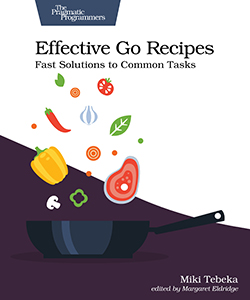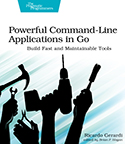About This Title
Pages: 276
Published: April 2024
ISBN: 9781680508468
In Print

Effective Go Recipes
Fast Solutions to Common Tasks
by Miki Tebeka
Programmers love Go because it is lightweight, easy to work with, and easy to read. Go gives you the benefits of dynamically typed languages (speed of development) while keeping the upsides of strongly typed languages (security and performance).
Go is a simple language, but programming in Go is about more than just mastering syntax. There’s an art to using Go effectively. Squeeze out the full use of advanced networking and multi-core power for which Go was designed. Save precious coding hours with recipes that help you manage objects, collect garbage, and safely use memory. Tackle Unicode, concurrency, and serialization with ease.
eBook Formats:
PDF for desktop/tablets
epub for Apple Books, e-readers
mobi for Kindle readers
Get all eBook formats here for $30.95 (USD)
Paperback Formats:
Order via Bookshop (U.S. Only)
Please support indie bookstores!
Find indie bookstores in the U.S. Find indie bookstores around the world.
All the clean, reusable solutions you need for a wide variety of problems common to Go development. Outfitted with these recipes, your next apps will be more polished and more maintainable than ever.
Start out by tackling time and see how the Go time packager provides types that will do most of the heavy lifting for you. Next, work on recipes tailored to the nuances of processing text, like normalizing strings to avoid bugs. From there, whip up some functions on-the-fly and store functions in variables and data structures.
Ever wondered why Go seems to be peppered with error handling? Working through the next recipes, you’ll discover the benefits, which include more robust code. In the section on HTTP, you’ll learn tricks like running multiple HTTP servers on the same port and setting timeouts. With concurrency recipes, you’ll limit the number of goroutines to improve performance, give your code awareness of timeouts, and decide when to keep your code sequential instead of making it concurrent.
Throughout the book, you’ll make Go sizzle following simple recipes and tweaking them to fit your own apps. Using tools like strong typing and concurrency primitives, build a Go codebase that stays maintainable at scale.
What You Need
You should know the Go language syntax and have some experience in programming.You will need a Go SDK, a Git client, and for some of the chapters, a C compiler.
Resources
Releases:
- P1.0 2024/04/05
- B7.0 2024/01/15
- B6.0 2023/12/13
- B5.0 2023/11/14
Contents & Extracts
- Preface

- Cooking with Go
- Who Are You?
- Reading This Book
- A Foolish Consistency Is the Hobgoblin of Little Minds
- Wait! There’s More! (online)
- Reading and Writing (I/O)
- Final Thoughts
- Using In-Memory Readers and Writers to Support []byte
- Compressing Old Log Files
- Using bytes.Buffer to Generate SQL
- Conditionally Decompressing Files
- Implementing io.Writer for Frequency Calculation
- Using os.Pipe for Dynamic Data Generation
- Searching in a Memory Mapped File
- Serializing Data
- Final Thoughts
- Streaming Events with encoding/gob
- Parsing Complex JSON Documents
- Streaming JSON
- Handling Missing Values in JSON
- Serializing Custom Types
- Unmarshaling Dynamic Types
- Parsing Struct
Tags

- Utilizing HTTP
- Final Thoughts
- Making GET Requests
- Streaming POST Requests
- Writing Middleware to Monitor Performance
- Setting Server Timeouts
- Supporting Several API Versions in the Same HTTP Server
- Working with Text
- Final Thoughts
- Using Formatting Verbs for Better Output
- Adding String Representation to Your Types
- Detecting Encoding
- Using Regular Expressions to Convert camelCase to lower_with_underscore
- Folding Strings for Case-Insensitive Comparison
- Using Unicode Normalization for Comparison
- Working with Functions
- Final Thoughts
- Using a Function Registry
- Using Functions as Options
- Using Closures to Provide Options with Arguments
- Passing Notifications with Functions
- Accessing Unexported Functions
- Working with Basic Types
- Final Thoughts
- Using the comma, ok Paradigm
- Using a Slice to Implement a Stack
- Calculating Cumulative Sum
- Serializing Time to/from JSON
- Using Composite Keys in
Maps

- Parsing Time Strings
- Working with Structs, Methods, and Interfaces
- Final Thoughts
- Using Ad Hoc Interfaces
- Wrapping the http.ResponseWriter Interface
- Using Generics to Reduce Code Size
- Using Generics for Type-Safe Data Structures
- Using Generics for Better Type Safety
- Working with Errors
- Final Thoughts
- Handling and Returning Errors
- Handling Panics
- Handling Panics in
Goroutines

- Checking Errors
- Wrapping Errors
- Using Goroutines, Channels, and Context for Concurrency
- Final Thoughts
- Converting Sequential Code to Parallel
- Limiting the Number of Goroutines with a Buffered Channel
- Using a Worker Pool with Channels
- Using context.Context for Timeouts
- Passing Logger with Request ID in Context
- Lower-Level Concurrency
- Final Thoughts
- Writing Idempotent Functions with sync.Once
- Waiting for Job Completion with sync.WaitGroup
- Allowing Multiple Readers with sync.RWMutex
- Using the Race Detector
- Using sync/atomic for a Faster Now
- Working with Sockets
- Final Thoughts
- Accepting Files over TCP Sockets
- Sending Files over TCP Sockets
- Writing a Serverless Platform
- Reading Time with NTP over UDP
- Communicating with Non-Go Code
- Final Thoughts
- Using os/exec to Ping Servers
- Calling C Functions to AlignText
- Redirecting Subprocess stdin and stdout to Prototype a Calculator
- Stemming Words Using a C Library
- Testing Your Code
- Final Thoughts
- Conditionally Running Continuous Integration Tests
- Reading Test Cases from a File
- Fuzzing Bugs Away
- Mocking HTTP Client Calls
- Writing Global Setup/Teardown Functions
- Running Services in Testing
- Writing a Linter
- Building Applications
- Final Thoughts
- Embedding Assets in Your Binary
- Injecting Version to Your Executable
- Ensuring Static Builds
- Using Build Tags for Conditional Builds
- Building Executables for Different Platforms
- Generating Code
- Shipping Your Code
- Final Thoughts
- Configuring Your Application
- Patching Dependencies
- Packaging Applications in Docker
- Catching Signals for Graceful Shutdown
- Writing Logs
- Using Metrics as Eyes to Production
- Debugging Running Services
Author
Miki has a B.Sc. in computer science from Ben Gurion University. He is the CEO of 353solutions, where he teaches and writes code in Go, Python, and Scientific Python. Miki has authored several books and is a LinkedIn learning author. He also organizes and give talks at several conferences around the world.eBook Formats:
PDF for desktop/tablets
epub for Apple Books, e-readers
mobi for Kindle readers
Get all eBook formats here for $30.95 (USD)
Paperback Formats:
Order via Bookshop (U.S. Only)
Please support indie bookstores!
Find indie bookstores in the U.S. Find indie bookstores around the world.
Related Titles:

About This Title
Pages: 276
Published: April 2024
ISBN: 9781680508468
Edition: 1
In Print




